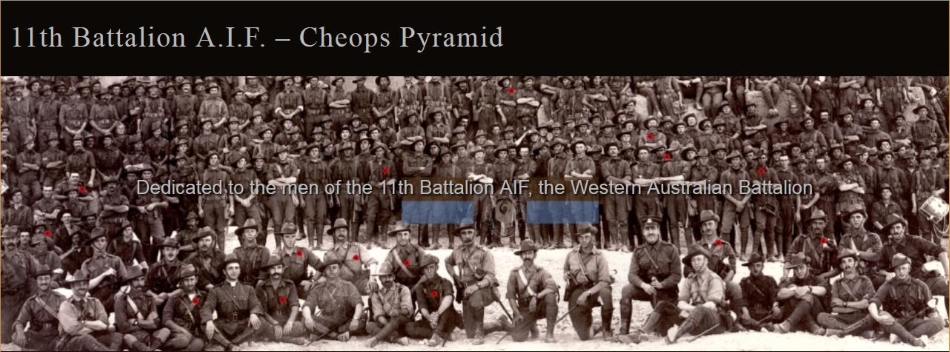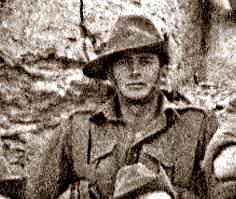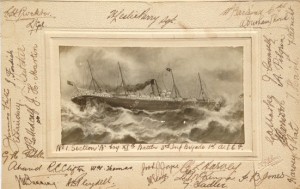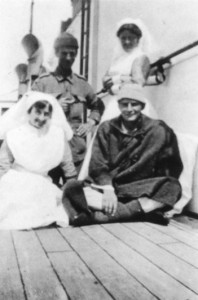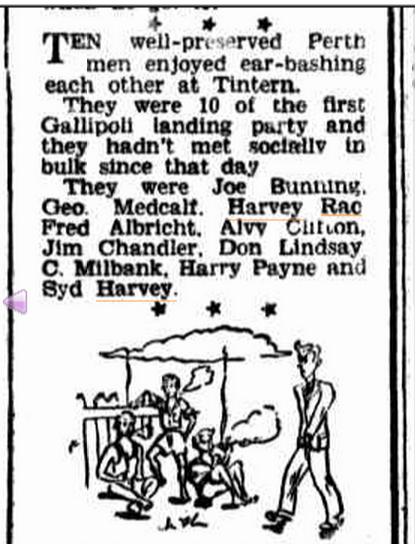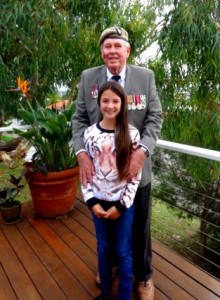Harvey George Rae - RTA - ID# 178

A story for Mia....
As the centenary of the Great War unfolds, many with family members who served overseas are remembering them and their sacrifices in minds and hearts.
Sifting through her personal memories of her much loved grandfather, Harvey George Rae, Pippa Murphy decided to write a memoir of him for her own granddaughter, Mia Murphy.
Her feelings for and recollections of Harvey bring him to life for a new generation of his family and explore the essence of the man. Here is Pippa’s story for Mia.
Harvey's story begins
This is the story of my Grandfather, Harvey George Rae (my Papa) who was born on 6 Jan 1889 in Victoria and was one of the thousands of brave Australian soldiers who left their normal jobs and lives behind forever when they joined the Australian Imperial Force to help the British Empire fight the European enemy in the Great War from 1914-1918.
2015 is a very special year as it will be exactly 100 years since a famous battle took place at Gallipoli in Turkey where your great, great grandfather fought with the 11th Battalion A.I.F.
In August 1914 when he was only 25 years old, he left his job as an accountant in a merchandise store in the Western Australian country town of Pingelly, enlisted and started basic training as an infantry soldier at the newly established army camp at Blackboy Hill, near Helena Vale, a suburb outside of Perth. He then became Private Harvey Rae, Ser# 1049, 11th Battalion, 3rd Brigade.
Troops were urgently required overseas to help boost the numbers of men needed to fight and he and his mates had little time in training! Fortunately, many had been brought up in the country or on farms so were strong had a lot of practical skills and common-sense and were good with a rifle.
Leaving Australia
HMAT Medic
At the end of October 1914, Harvey’s battalion left the camp at Blackboy Hill and travelled by train to Fremantle where they boarded the troopships Ascanius and Medic. Harvey’s company went aboard the Medic and he and others in his section signed a photograph of the ship which he later brought home.
These two ships waited outside Fremantle Harbour until the massive convoy of troopships sailing up from Albany arrived. They then joined the convoy which had the huge Japanese warship Ibuki as their main escort to protect them from attack.
These troopships carried not only thousands of young men who had never left home before but hundreds of horses, their equipment and supplies of food for the long journey.
"A" Company, 11th Battalion,
February 1915. Harvey Rae
in back row fifth from left.
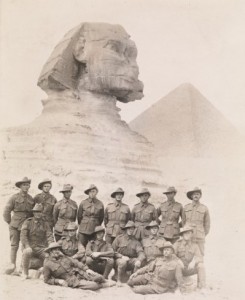 Harvey arrived at Alexandria in Egypt on 12 December 1914 and had his first Christmas away from home.
Harvey arrived at Alexandria in Egypt on 12 December 1914 and had his first Christmas away from home.
He and the other men had to endure several months of training in the deserts of Egypt before boarding the troopships that would take them to Lemnos , an island off Greece where the men trained for another six weeks.
Because the Army commanders thought so highly of the men in Harvey’s battalion, they were chosen to be the first to attack the Turkish enemy.
On Sunday, 25th April 1915 at 4.15am, Harvey and the others in his battalion climbed into small landing boats which had been lowered over the side of the destroyer HMS London and the soldiers squashed in tightly together along with their rifles and equipment and were rowed ashore to land north of Anzac Cove.
The Turkish soldiers had dug in trenches on the hill tops so they were in a perfect position to see them land just as the sun was rising. In some places along the coast where the troops were landing there was barbed wire in the water and many could not swim which made it even worse as their heavy packs weighed them down whilst they were trying to scramble over slippery rocks. Many Turkish bullets were finding their mark, hideous loud shells were exploding over their heads and men were dying or screaming in agony from their wounds all around him.
Harvey couldn't wait to jump out of his boat to try and avoid being shot!
A letter home
Harvey later wrote a letter to his parents describing what happened to him after the landing and that letter, which I have included here, was published in the magazine of his former school, Scotch College. It tells you of the horrific time he endured and how lucky we are that he survived, especially me, as I was able to grow up to love him as part of my family.
Ras el-Tin Hospital,
Alexandria, Egypt.
8 May 1915
As my right hand is very stiff still from the effects of a clean bullet wound through the upper arm, I am not able to write myself, but have availed myself of the services of one of our company (Sim McGregor Wood), who is also here wounded.
The 3rd Brigade had the honour of being the first to land at daylight on Sunday morning, 25th ult. A. and C. companies of the 11th being in the van. We got a very warm reception, but our chaps managed—although I am afraid at very great expense—to dislodge the Turks from what seemed a very strong position.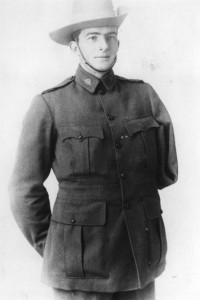
Unfortunately, I missed the first hour or so of fighting, as, together with Albrecht, I was responsible for bringing up ammunition and I trust I never have such an experience again. It was hard enough to get up the hill oneself without lugging about a cwt. of pills. However, we got it up to the platoon in due course, and were relieved. During the scramble I got a shot through the side of my hat.
After this, I was with the platoon, although we got rather mixed up with N.Z.’s and others, till I got shot with an explosive bullet in the left upper arm about 2 o’clock in the afternoon. As things were very lively I had to lie under cover till 8 p.m., when some of the boys come back just in the nick of time to save me from being nabbed by the Turks, who were actually on me when some New Zealanders arrived.
These chaps were exceedingly good to me, but being very faint and weak from loss of blood, it was hard for them to get me back to the beach, as the track (?) was so rough. However, I eventually reached the hospital station and was put aboard a cutter just about daylight on Monday morning. Here I seem to have lost touch, and next I knew I was aboard the SS. Itonus steaming for Alexandria on Tuesday evening.
Details from NAA: B2455 RAE, Harvey GeorgeThere was a tremendous crowd of wounded, but I must say the staff worked very hard. My left arm went gangrenous, and Col. Newmarsh and Capt. Poate took it off on Thursday afternoon, and I really think I was rather relieved as I seemed to fear something more serious should happen if this had not been done.
We arrived at Alexandria on Friday morning and were installed here during the afternoon. The same evening I was in the theatre getting my arm properly fixed, as the appliances on board the Itonus had not permitted of finishing touches.
We are very well looked after here, and I think the wound is progressing well as possible. The wound in the right arm is nothing, and should heal up in a few days, when I expect the stiffness now felt in the fingers will disappear.
Being at a loss how to send you word, I thought and got the nurse to write a letter to my friend Jacques asking him to cable you that I was in hospital here, as I have absolutely nothing—not even my clothes— and it is really impossible to move the authorities unless you can apply personally which, of course, I hope to do very shortly. I have since had a letter from Suares advising of your reply to the cable. The Presbyterian parson also kindly volunteered to supply me with cash. I am hoping that in the course of a few weeks the powers that be will allow me to go back to Australia, as of course I can be no longer fit for service.
I hope, however, to be able to take a run up to Cairo for a few days to see Suares and the Light Horse boys, although probably the latter will have gone to the front before I reach that stage. It is very hard for us to know who has been hit and who has escaped. Meddy, (George Medcalf) so far as I am aware, got through the first day and as he was acting as observer to Major Brockman he would probably run a good chance of getting through.
I fear when the reckoning comes it will be a severe one for W.A. and indeed, the whole 3rd Brigade. I expect you will know more than we will about such matters, as the authorities are very stingy with information here.
I am not writing to anyone else, as one letter is all I can hope to get through, but you will of course pass this on. It was really wonderful the way the chaps went into action, and I think not one of them thought much of it, and the cheerful way of the wounded here is really wonderful.
I trust this will find you all well.
Your affectionate son, Harvey G. Rae.
“P.S.—This is not a kid's signature, although it looks like one. H.G.R. is feeling and looking splendid, but he is under the impression that he can write invisible letters with an invisible left hand. His beard is nice and curly. SMW
A bride and a new life
When he had recuperated from having his arm amputated, he was given permission from the Army (as long as he paid his way and had his aunt accompany him as a carer) to take the first mail steamship back to West Australia.
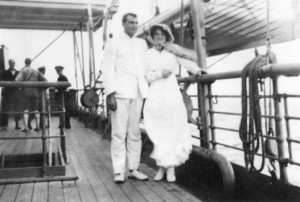 He quickly snaffled up his waiting fiancée, Ethel Jeanette (Nettie) Stirling of Claremont before returning to England to commence a new job with George Wills and Son Ltd. as a one armed married man.
He quickly snaffled up his waiting fiancée, Ethel Jeanette (Nettie) Stirling of Claremont before returning to England to commence a new job with George Wills and Son Ltd. as a one armed married man.
Malcolm Harvey Rae, my father, the first of 4 children, was born during a Zepplin raid in London as England was now being bombed daily by the Germans.
He and his mother were dispatched down south away from London to a less dangerous area.
In 1922, Harvey transferred to a new branch of George Wills and Son Ltd in New Jersey, USA as shipping manager before returning a couple of years later to Western Australia to start an accountancy firm, Hendry and Rae.
This firm later became Hendry, Rae and Court and included another partner, Sir Charles Court, a man who went on to become Premier of Western Australia and who remained Harvey’s closest friend for life. They had holidays together in Nornalup over the summer to avoid Perth's heat.
H.G. (that was his nickname) served on the Claremont Council, was Secretary of the W.A. State Wool Committee and a Justice of the Peace and became a member of Adult Education Board of W.A. He was also a District Commissioner with the Scouting movement.
Memories of Papa
I called him Papa. He became very resourceful and physically independent with a great mind and spirit as he adjusted with great difficulty and determination to his new life with one arm. Imagine trying to do up your shoelaces one handed (no Velcro then!) tie his tie (everyone wore a tie in those days), throw a coat over his shoulders and button it up. This was something he excelled in demonstrating to all of his awe struck grandchildren whilst holding one end of the collar in his teeth! It landed perfectly square on his shoulders each time! Try it!
"Frenchy" PaPa
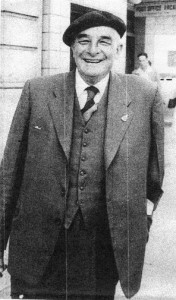 At Christmas family celebrations I looked forward to when he would entertain us by putting his "good" right arm behind his back, then striding up and down the length of the kitchen, loudly reciting limericks with the odd song thrown in whilst we kids did the washing up.
At Christmas family celebrations I looked forward to when he would entertain us by putting his "good" right arm behind his back, then striding up and down the length of the kitchen, loudly reciting limericks with the odd song thrown in whilst we kids did the washing up.
Occasionally, a very funny naughty ditty came out and we would all burst out giggling! He was also a good whistler and loved the song Danny Boy - too much, so some of his neighbours reckoned! Extra special Xmas treats of Callard and Bowsers Nougat, a jar of Bonbons or box of special Newman’s chocolates were especially appreciated. I loved the bonbons; they had choccy toffee centres and looked so pretty with their many different colours glistening.
Sadly he lost his wife Nettie to leukemia which is a horrible blood disorder when she was sixty two years old. She had been by his side, always there to help care and look after him and he was never able to settle down happily again without her. He led a very fulfilled life, forever eager to help people professionally and personally when he worked as a highly efficient organizer in his accountancy practice.
(Left - Sunday Times 3 November 1946)
Over time as I grew up, I became increasingly aware as to how clever he had become to manage to raise four children along with the simple things we take for granted that must have been so hard for him to achieve.
Lifting your young son up over your head to sit him on your shoulders with one arm requires tremendous strength and technique not easily acquired. Try cutting the top off a boiled egg one handed!
In 1968, he became very ill. I had just completed my nursing training at Fremantle Hospital so I felt most fortunate in being able to nurse him in his last days at Hollywood Hospital where he lost his battle with stomach cancer and died on the 6 June 1968. He is buried and at peace in Karrakatta Cemetery, Perth.
I remember him as a special character with strong disciplines, a big booming voice (which I inherited!) and a wonderful twinkle in his eye which I loved, especially when he wore his Frenchy beret.
It was a privilege to have loved and known him as a member of my family and as one of those brave young men who sacrificed so much to make it possible for me and all Australians to live as we do now, independent and free. Never will I forget all those who died and did not come home to their families.
R.I.P. "Papa" Rae
xOxOx
Postscript
There is a post script to Pippa’s story for Mia which illustrates only too clearly the importance of commemorative events such as we've recently experienced (Anzac Day, April 2015).
Feelings, insights and information that have remained submerged over the years are brought to the surface and enhance a family’s understanding of their shared history.
Pippa describes three such instances that have resulted from her decision to write Harvey’s story for Mia……
Mia & her grandfather Mike MurphyThe first instance occurred when my former soldier husband Mike, who rarely marches, took his own medals and Harvey’s down to York St, Albany for the Anzac march so his granddaughter standing in the crowd could remember this special moment in years to come. On reflection, Mike realized he also served in the 11th Battalion, “A” Company whilst CO of the Reserve unit in Albany after retiring from the regular Army. This coincidence only emerged as we chatted after the march!
The second instance came when, after researching Harvey’s life, I realized I had missed a wonderful opportunity to have learnt more about his lifelong friendship with his business partner, Sir Charles Court. My husband Mike had been in the SAS in Swanbourne when Charles Court was Patron of the Regiment. Not realizing at that time, Sir Charles’s connection to Harvey, I missed the chance to chat to him during dining-in nights at the Officers Mess about his life-long friendship with my grandfather. All that lost information as well as the pleasure of discovery!
Perhaps the best instance occurred when my very clever sister told me she was stirred to attend her first Anzac Day Service and greatly enjoyed being part of the whole experience after reading my story for Mia. She now realizes how little she knows of those years and their impact on West Australia’s history. It has been wonderful to see her learn more about what happened all those years ago. She, along with so many others, would have remained ignorant had not these commemorative events revealed so much about our not too distant past.
Pippa Murphy (nee Rae) has very generously given us permission to reproduce her story for Mia and share her photographs and memories of her grandfather with us. Thank you Pippa.
Edited by Julie Martin with additional research by Judy Purkiss
Sources
National Archives of Australia (www.naa.gov.au)
National Library of Australia, Trove (http://trove.nla.gov.au)
